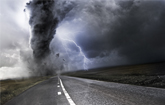
Weathering the Storm
5 tips for disaster preparation
MISSION, Kan., Nov. 3, 2021 /PRNewswire/ -- (Family Features) Over the past year, homeowners from coast to coast have experienced tussles with Mother Nature from arctic storms and heat waves to powerful hurricanes. Not only can storms wreak havoc on homes, they damage the fragile electric grid, which may result in power outages that can sometimes leave families in the dark for days or weeks.
While no amount of preparation can stop the forces of nature, planning ahead to manage blackouts can have a significant impact on you and your family. Get your home ready for what lies ahead with these tips from the Propane Education & Research Council and Anthony Carrino, a home designer, developer and contractor with more than 20 years of experience in the industry.
Outdoor Maintenance
You may not realize it, but chores like cleaning the gutters and keeping your vegetation trimmed can actually make a big difference in the event of a major storm. If your gutters are full of debris, water rushing from your roof has no place to go, and that could mean major damage to your roof, siding and even foundation.
Falling branches and trees can create a great deal of damage not only on your home but also to surrounding powerlines, which can easily break, so it's a good idea to monitor closely for branches that could be affected by high winds and promptly remove dead trees that are especially risky in inclement weather.
If there's time, you should also secure any outdoor furniture or belongings that could blow away or get damaged in the storm. If you have them, secure the storm shutters. It's also a good idea to evaluate your yard's grading at least once a year to be sure the ground slopes away from the house to keep water from pooling against your foundation.
Standby Power
Major weather events are often accompanied by extended power outages. Homeowners may turn to portable generators to turn the lights back on after the storm has passed. However, they are difficult to find and can only power a small portion of a family's home.
Unlike a portable generator, which can power only a few appliances in a home, a propane-powered standby generator or backup generator can be a total home solution, depending on the size of the unit. When a homeowner purchases a backup generator, a licensed technician installs the unit outside of the home and wires it to the home's electrical system. When a power outage occurs, the generator automatically senses the disruption of service and starts the generator's engine, which then delivers power to select appliances in the home.
Propane-powered standby generators can supply supplemental electricity in as little as 10 seconds after an outage. They are available in a variety of capacities to fit the needs of any size home and can power several major appliances, including furnaces, boilers, water heaters, cooking equipment, fireplaces and clothes dryers.
For homes that already run on propane, consider running important systems and appliances like the furnace, water heater, stove and fireplace on propane so they'll continue to run even during a power outage. The more appliances that run on propane, the smaller and less expensive your standby generator can be. Plus, propane is environmentally friendly and won't degrade over time like some other fuel sources, ensuring the backup generator reliably powers your home to give you added peace of mind.
Home Systems
If your home is struck by a major storm, you may need to manually turn off the power, gas or water to prevent a life-threatening situation or further damage. Refresh your memory regularly on where the shut-off valves are located. If your home has a propane tank, open the lid of the tank to reveal the shut-off valve then turn it to the right to shut off the propane. If there are multiple tanks, turn them all off the same way. If possible, be certain at least two members of the family are able to perform a safe shut-off just in case someone is injured or unable to access the shut-off site. If you turn off the propane, make sure a qualified technician from your propane supplier turns the gas back on and performs a leak check. Ensuring there isn't an issue is another step to safeguard your family after a disruption of service.
Insurance Coverage
When your home is in the path of a major storm, insurance is an important way to protect your investment. Reviewing your insurance coverage at least annually, if not every six months, can help you stay well-informed about possible exclusions and ensure you have the opportunity to increase your limits if you've made improvements or values have grown in your area.
An important aspect of good coverage is a thorough inventory of your possessions that details what you own and could potentially lose in a major storm. Including details like purchase price and condition may help smooth the way if you have to file a claim.
Emergency Kit
Storms can blow in fast, so having some emergency equipment you can grab in a hurry may help ease your storm response. Include flashlights, a battery-powered radio, cellphone charger and cash. You should also include first aid supplies, essential medications for everyone in the family, some nonperishable food and an adequate supply of water. Also include clothing and toiletry items, as well as supplies to care for your pets. It's also a good idea to have copies of important records like your insurance policy, an emergency contact list and any other personal documents you may need.
By planning ahead with an emergency kit, propane-powered generator and other steps, you can put your family and home in a better position to ride it out as safely and comfortably as possible – giving you peace of mind during and after the weather-related event.
Find more ideas to help get your home storm-ready at Propane.com/Generators.
Photos courtesy of Anthony Carrino, TheBuild.tv
Michael French
[email protected]
1-888-824-3337
editors.familyfeatures.com
About Family Features Editorial Syndicate
A leading source for high-quality food, lifestyle and home and garden content, Family Features provides readers with topically and seasonally relevant tips, takeaways, information, recipes, videos, infographics and more. Find additional articles and information at Culinary.net and eLivingToday.com.
SOURCE Family Features Editorial Syndicate






Share this article